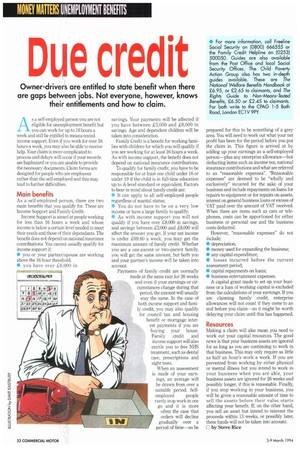Due credit
Page 36

If you've noticed an error in this article please click here to report it so we can fix it.
Owner-drivers are entitled to state benefit when there are gaps between jobs. Not everyone, however, knows their entitlements and how to claim.
As a self-employed person you are not eligible for unemployment benefit but you can work for up to 16 hours a week and still be entitled to means-tested income support. Even if you work for over 16 hours a week, you may also be able to receive help. Your claim is more complicated to process and delays will occur if your records are haphazard or you are unable to provide the necessary documents. Claim forms are designed for people who are employees rather than the self-employed and this may lead to further difficulties.
Main benefits As a self-employed person, there are two main benefits that you qualify for. These are Income Support and Family Credit.
Income Support is aimed at people working for less than 16 hours a week and whose income is below a certain level needed to meet their needs and those of their dependants. The benefit does not depend on national insurance contributions. You cannot usually qualify for income support if;
• you or your partner/spouse are working above the 16 hour threshold; • you have over £8,000 in savings. Your payments will be affected if you have between £3,000 and £8,000 in savings. Age and dependent children will be taken into consideration.
Family Credit is a benefit for working fami lies with children for which you will qualify if you are working for at least 16 hours a week. As with income support, the benefit does not depend on national insurance contributions.
To qualify for family credit, you have to be responsible for at least one child under 16 or under 19 if the child is in full-time education up to A-level standard or equivalent. Factors to bear in mind about family credit are: • It can apply to all self-employed people regardless of marital status; • You do not have to be on a very low income or have a large family to qualify; • As with income support you will not qualify if you have over £8,000 in savings, and savings between £3,000 and £8,000 will affect the amount you get. If your net income is under £69.60 a week, you may get the maximum amount of family credit. Whether you are a one-parent or two-parent family, you will get the same amount, but both you and your partner's income will be taken into account.
Payments of family credit are normally made at the same rate for 26 weeks and even if your earnings or circumstances change during that period, the amount will usually stay the same. In the case of both income support and family credit, you may also qualify for council tax and housing benefit or mortgage interest payments if you are buying your house. Family credit and income support will also
entitle you to free NHS treatment, such as dental care, prescriptions and sight tests.
When an assessment is made of your earnings, an average will be drawn from over a suitable period. Self employed people rarely stop work in one go and it is more often the case that orders will decline
I1111111 gradually over a
period of time—so be prepared for this to be something of a grey area. You will need to work out what your net profit has been for the period before you put the claim in. This figure is arrived at by adding up your earnings as a self-employed person—plus any enterprise allowance—but deducting items such as income tax, national insurance contributions and what are referred to as "reasonable expenses". "Reasonable expenses" are deemed to be "wholly and exclusively" incurred for the sake of your business and include repayments on loans for repairs to equipment or for repairs on assets, interest on general business loans or excess of VAT paid over the amount of VAT received. When there are items such as cars or telephones, costs can be apportioned for either business or personal use and the business costs deducted.
However, "reasonable expenses" do not include: • depreciation; • money used for expanding the business; • any capital expenditure; • losses incurred before the current assessment period; • capital repayments on loans; • business entertainment expenses.
A capital grant made to set up your business or a loan of working capital is excluded from the calculations of your earnings. If you are claiming family credit, enterprise allowances will not count if they come to an end before you claim—so it might be worth delaying your claim until this has happened.
Resources Making a claim will also mean you need to work out your capital resources. The good news is that your business assets are ignored for as long as you are continuing to work in that business. This may only require as little as half an hour's work a week. If you are prevented from working by either physical or mental illness but you intend to work in your business when you are able, your business assets are ignored for 26 weeks and possibly longer, if this is reasonable. Finally, if you stop working in your business, you will be given a reasonable amount of time to sell the assets before their value starts affecting your benefit. If, on the other hand, you sell an asset but intend to reinvest the proceeds within 13 weeks, or possibly later, these funds will not be taken into account.
E by Steve Rice
















































































